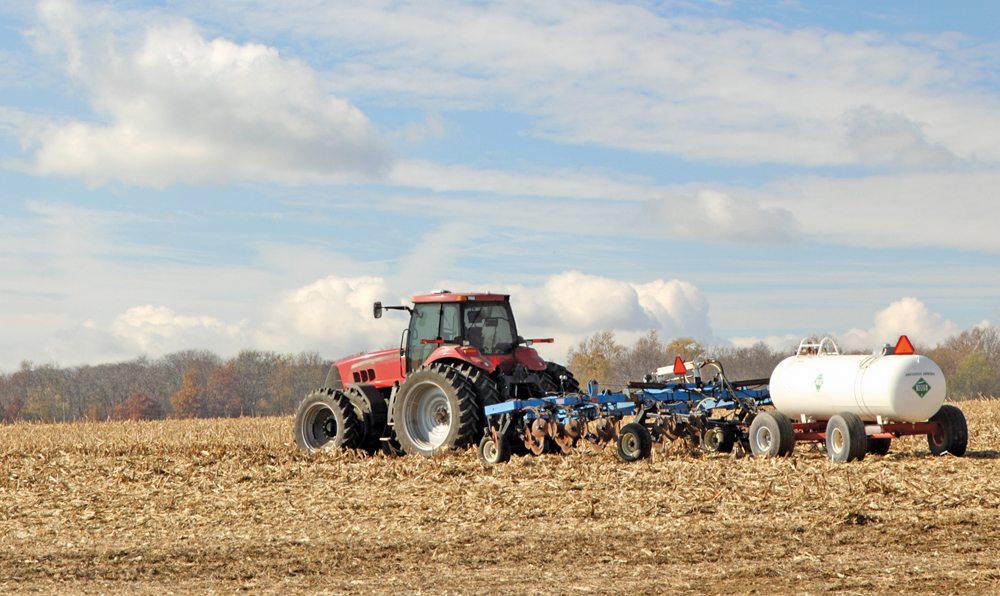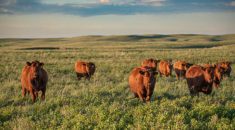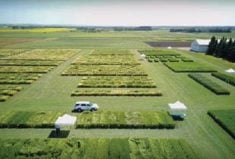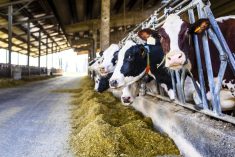It’s hard to put exact numbers on it — but Alberta’s carbon tax is taking its toll, say farmers.
And that toll increased at the start of the year, when the carbon tax increased to $30 a tonne — a 50 per cent jump from the initial $20-a-tonne tax implemented a year ago.
For some things, the per-unit impact is known but then you have to calculate usage. For example, the Jan. 1 increase added another 50 cents to a gigajoule to natural gas prices bringing the total extra cost from the carbon tax to $1.51.
That adds up in a hurry when you’re drying grain, said Stephen Vandervalk, who grows malt barley, durum, canola, and export timothy on his 10,000-acre farm near Fort Macleod.

“You could easily go through 400 to 600 gigajoules when you’re grain drying, or even more if you’re farming up north,” he said.
But other costs are harder to calculate, such as the impact on the cost of shipping grain on part of the route to West Coast terminals. But it’s already very expensive to transport grain from Western Canada and none of the export countries he competes against has a carbon levy, said Vandervalk, noting Australia had one but scrapped it.
Vandervalk is the Alberta vice-president of the Western Canadian Wheat Growers, which has been actively lobbying MPs and speaking to agricultural committees in Ottawa as the federal government prepares to bring in legislation requiring carbon taxes in every province. (Provinces “without a provincial carbon pollution pricing system” would be subject to a federal carbon tax, starting at $10 per tonne this year, and rising to $50 per tonne by 2022.)
Team Alberta, which represents the province’s four largest crop commissions (wheat, barley, pulses, and canola) has been lobbying provincially, including taking part in meetings on the Climate Leadership Plan, the NDP government’s strategy to cut carbon emissions.

“We’re trying to bring the government to the realization about how it will affect primary producers,” said Alberta Barley chair Jason Lenz.
Their key point is that farmers will pay more for inputs but have no way of passing on those extra costs.
“If I’m buying fertilizer, the supplier adds a carbon tax on to his input prices,” said Lenz, who farms near Bentley.
In some cases, the tax also lowers the prices farmers receive, he said.
When barley goes to a malt plant or canola to a crusher, those operations pay the tax, too, and they make up for it by reducing the price they pay for that barley or canola, said Lenz.
Read Also

Innovation takes centre stage at record-breaking Ag Expo
Lethbridge event hits capacity with 326 global exhibitors showcasing the latest ag tech, innovation and the 129th North American Seed Fair.
Alberta Barley is also working to nail down the precise cost impact on farmers while lobbying the provincial government to have input on carbon-reducing projects funded by the carbon tax.
Milk producers have noticed increases in their gas bills, as well as their electricity costs, said Albert Kamps, vice-chair of Alberta Milk.
“It is an impact and it’s not substantial, but it does cut into the bottom line,” he said. “That should show up in the dairy cost studies.”
Like Team Alberta and the Western Canadian Wheat Growers, his organization is working to tally the extra cost borne by its members. Kamps also points out that milk producers can do little to reduce their natural gas use because they need hot water for clean facilities and clean milk, and to keep barns warm for animals.
Purple fuel (gasoline used on farms) has been exempted from the carbon tax, which now adds 6.7 cents to a litre of regular gas. And while that’s appreciated, cattle producers haven’t seen any benefits from the money raised by the tax which has increased costs for heating and electricity, said Kelly Smith-Fraser, vice-chair of Alberta Beef Producers.
Like grain production, the cattle business is an export-oriented industry, and ranchers are now at an economic disadvantage to their foreign competitors, she said.
Smith-Fraser, who raises Maine-Anjou cattle near Pine Lake, would like to see an ecosystems service program that would help ranchers care for their grasslands.

“That would assist us financially and environmentally, and ensure that those grasslands remain as they are and are not converted to cropland,” she said.
Farmers from across the province have complained there’s been no meaningful recognition of environmental benefits produced by farms and ranches, such as carbon sequestration and grassland preservation.
The province issues carbon tax rebates for lower- and middle-income earners. It says the rebate for one-third of households is larger than their carbon tax costs; another third have most of their extra costs covered; and one-third receive no rebate.
But government efforts to reduce carbon emissions affect farmers in different ways, said Vandervalk. He points to technology that reduces emissions on tractors but adds $70,000 to $80,000 to their price tag.
“Tractors are getting used 200 to 300 hours a year,” he said. “That’s a pretty big expense for that amount of use. It’s not like a car where you are in it 365 days a year.”
















